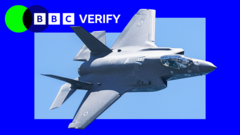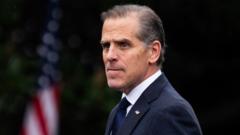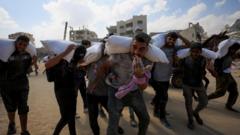In the wake of escalating violence between Israel and Hamas, the international community is grappling with overwhelming evidence of war crimes. The conflict, which erupted dramatically on October 7, 2023, when Hamas launched a surprise attack claiming the lives of 1,200 Israelis, has prompted serious allegations against both parties involved.
### Raw Evidence of War Crimes in Gaza Sparks Global Outcry

### Raw Evidence of War Crimes in Gaza Sparks Global Outcry
As the Israel-Gaza conflict escalates, allegations against both sides mount, gripping international attention.
Israeli Prime Minister Benjamin Netanyahu had initially perceived Palestinians as a manageable issue, prioritizing confrontations with Iran and striving for normalization of relations with Saudi Arabia. However, the reality was more complex, as Netanyahu has since faced scrutiny for intelligence failures that allowed Hamas to execute its deadly plans.
As the situation in Gaza deteriorates, reports indicate a marked increase in civilian casualties, with tens of thousands of innocent lives lost since the beginning of the conflict. Israeli responses, including bombardments and ground assaults, have drawn condemnation from international leaders. Critics argue that these military actions may constitute war crimes, given the starvation of civilians and the large-scale destruction of communities deemed disproportionate to the military threat posed by Hamas.
The International Criminal Court has issued arrest warrants for Netanyahu and former defense minister, citing war crimes, an assertion they vehemently deny. Additionally, accusations against Israel of genocide have surfaced at the International Court of Justice but have been dismissed by Israeli officials as baseless and antisemitic.
Western allies are reevaluating their stances, expressing frustration over Israel's handling of the humanitarian crisis in Gaza. A joint statement issued by foreign ministers from several countries criticized the Israeli government's aid distribution model, describing it as dangerous and degrading to human dignity amidst the ongoing humanitarian disaster. Reports reveal widespread fatalities among civilians seeking aid and essential resources amid the chaos of war.
While discussions of potential ceasefires circulate, skepticism remains regarding the prospects for peace. Netanyahu's coalition faces pressures from extremist nationalists opposing a truce, leaving him politically vulnerable and compounded by ongoing corruption trials. As the Knesset prepares for summer recess, the chance for diplomatic negotiations hangs in the balance.
The implications of this conflict extend beyond immediate military concerns, impacting global politics and humanitarian discourse. If a ceasefire is achieved, it may illuminate a path towards dialogue; however, the lasting impacts of this war will likely continue to resonate for years to come, reshaping the landscape of international relations and human rights advocacy in the region.
As the situation in Gaza deteriorates, reports indicate a marked increase in civilian casualties, with tens of thousands of innocent lives lost since the beginning of the conflict. Israeli responses, including bombardments and ground assaults, have drawn condemnation from international leaders. Critics argue that these military actions may constitute war crimes, given the starvation of civilians and the large-scale destruction of communities deemed disproportionate to the military threat posed by Hamas.
The International Criminal Court has issued arrest warrants for Netanyahu and former defense minister, citing war crimes, an assertion they vehemently deny. Additionally, accusations against Israel of genocide have surfaced at the International Court of Justice but have been dismissed by Israeli officials as baseless and antisemitic.
Western allies are reevaluating their stances, expressing frustration over Israel's handling of the humanitarian crisis in Gaza. A joint statement issued by foreign ministers from several countries criticized the Israeli government's aid distribution model, describing it as dangerous and degrading to human dignity amidst the ongoing humanitarian disaster. Reports reveal widespread fatalities among civilians seeking aid and essential resources amid the chaos of war.
While discussions of potential ceasefires circulate, skepticism remains regarding the prospects for peace. Netanyahu's coalition faces pressures from extremist nationalists opposing a truce, leaving him politically vulnerable and compounded by ongoing corruption trials. As the Knesset prepares for summer recess, the chance for diplomatic negotiations hangs in the balance.
The implications of this conflict extend beyond immediate military concerns, impacting global politics and humanitarian discourse. If a ceasefire is achieved, it may illuminate a path towards dialogue; however, the lasting impacts of this war will likely continue to resonate for years to come, reshaping the landscape of international relations and human rights advocacy in the region.



















